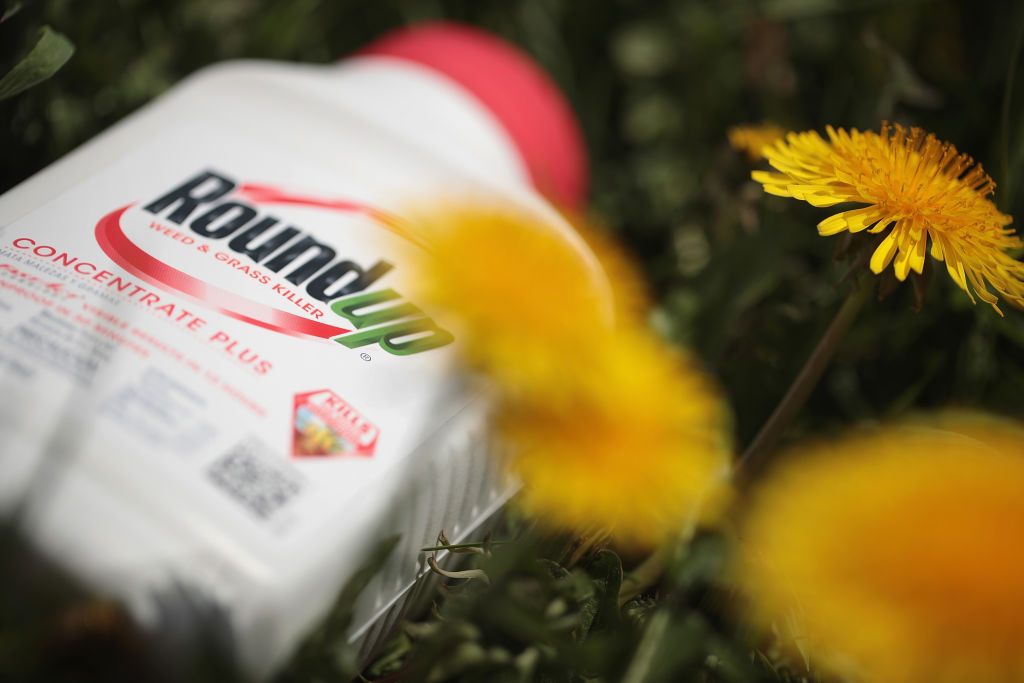7:00
News Story
Bill to shield pesticide makers from cancer lawsuits faces long odds in Missouri Senate
Bayer has already paid out $10 billion for claims Roundup caused plaintiffs’ non-Hodgkin’s lymphoma
Time is running out for legislation that would make it harder to sue pesticide manufacturers over claims their products cause cancer, with an unusual coalition of opponents working to ensure they’ve stalled the bill’s progress.
The bill, critics argue, shields large corporations at the expense of everyday Missourians who have developed non-Hodgkin’s lymphoma they attribute to the use of pesticides formulated with glyphosate — most prominently, Roundup.
Supporters, including Roundup’s manufacturer, Bayer, say the lawsuits are unfair because glyphosate has been approved by environmental regulators who have determined it is “unlikely” to cause cancer in humans.
“Going through that litigation process and having this patchwork of labeling requirements has cost this company billions of dollars,” said Catherine Hanaway, an attorney for Bayer and former Missouri House speaker, “even when there’s consistent scientific consensus that glyphosate does not cause cancer.”
The legislation cleared the House and has until 6 p.m. Friday to pass the Senate, which has been marked this year by gridlock and dysfunction and is currently bogged down in a multi-day filibuster.
It pits powerful agriculture and business organizations against trial attorneys that have built an alliance with GOP lawmakers known for bringing the state Senate to a halt: the Missouri Freedom Caucus.
“It’s not a traditional alliance,” said Amy Gunn, president of the Missouri Association of Trial Attorneys, “but I appreciate…that there are people on both sides of the aisle that can recognize the importance of not limiting our rights.”
The legislation, sponsored by Republican state Rep. Dane Diehl of Butler, would protect Roundup manufacturer Bayer from lawsuits by plaintiffs who claim the company failed to warn them that glyphosate might be carcinogenic. Bayer maintains that it’s safe, though it has paid billions to settle Roundup claims or pay out jury judgments.
Specifically, the legislation would dictate that pesticides that are registered with the Environmental Protection Agency and carry an approved label consistent with the EPA’s opinion on whether the ingredients are carcinogenic satisfies its duty to warn customers, insulating Bayer from “failure to warn” cases. Bayer argues
“We believe anything that’s gone through the full regulatory process…and has been deemed safe through multiple studies, multiple endeavors — over time of about 50 years on certain products — that they have fulfilled their duties to warn of the dangers associated with the product,” Diehl said in a Senate committee hearing last month.
‘This bill is about protecting a corporation over the citizens of our state’
Bayer said it has set aside about $16 billion to deal with Roundup lawsuits, including more than $10 billion it has already paid out in settlements. It has lost other cases at trial.
Earlier this year, a jury in Philadelphia awarded a plaintiff $2.25 billion. Last year in Cole County, three plaintiffs were awarded $1.56 billion, though a judge later reduced that to $622 million.
Bayer says the settlements it has paid out don’t represent an admission of wrongdoing. It stands behind the product and says it has won in cases where the court allowed it to present studies that deem glyphosate safe.
But it’s looking at “several options” for the future of Roundup, said Jessica Christiansen, head of sustainability and stewardship for crop science at Bayer.
“We’ve been pretty clear that the cost and the burden of the lawsuits is not sustainable,” she said in an interview with The Independent when asked if Bayer would pull Roundup from shelves.
Missouri farm groups have backed the pesticide labeling legislation, saying farmers need assurance Roundup will be available for the long term.
“We feel strongly that pesticides are an essential crop protection tool that provide many environmental benefits by enabling conservation practices,” Jacob Knaebel, a lobbyist for the Missouri Corn Growers Association, told a Missouri Senate committee last month.
Christiansen, however, said it was “simply not true” that the legislation would provide blanket immunity for Bayer from litigation. She wouldn’t say whether it would shield the company from liability in “failure to warn” cases, but its sponsor and other supporters say that’s the idea.
Bayer says there are other means by which people can sue, including product failures and warranty claims.
“There’s other ways that people can still file lawsuits, and they have the right to do that, but on this particular issue, we support the science and the labeling should be supported by science as well,” she said.
Gunn panned that argument.
“That’s been a talking point for the Bayer people, which sort of begs the question — okay, well then why do you want (the legislation)?” she said. “And the answer is clearly that the vast majority of the successful claims are based on a ‘failure to warn’ cause of action.”
Melissa Vatterott, policy director for the Missouri Coalition for the Environment, said the legislation is “not the right thing for Missouri’s people.”
“The fact that Bayer has lobbied not only legislators in Missouri but in three other states…shows that this bill is about protecting a corporation over the citizens of our state,” she said.
Prospects for passage
If the Senate does manage to take up the pesticide labeling bill before Friday’s adjournment, Vatterott said she doesn’t think the bill has enough support to make it to the governor’s desk.
Efforts to make it harder for Missourians to file litigation against businesses have historically had the support of Republicans, who hold super majorities in both the House and Senate. But in more recent years, those bills have run into GOP opposition. This year, that resistance is led by the Freedom Caucus.
The rise of Republican criticism of these bills comes as trial attorneys have shifted their strategy from supporting Democratic candidates with donations to cutting big checks to Republicans aligned with the Freedom Caucus.
The Missouri Chamber of Commerce and Industry says trial attorneys’ donations have helped “slow down the momentum on tort reform.”
“There is no doubt that the plaintiffs’ bar has taken a very, very active interest in lobbying and attempting to fund campaigns and candidates who are anti-tort reform,” said Brendan Cossette, the chamber’s chief of operations.
Between 2005 when Republicans took control of the Missouri General Assembly until 2019, Cossette said, the legislature routinely passed “tort reform” legislation.
Cossette said the chamber still has some hope the pesticide bill might pass.
“There’s always a chance,” he said. “The bill’s never really dead until the end of session…and you never know what dam might break and what bills might start going through.”
Gunn doesn’t see certain conservative lawmakers’ opposition to the pesticide bill as a product of campaign donations.
“If you look back over the last number of years, there has been…an alliance based on a mutual respect for the Seventh Amendment,” Gunn said.
The Seventh Amendment to the U.S. Constitution protects the right to a jury trial in civil cases.
Should the legislation pass, Gunn said, people who develop cancer they believe was caused by Roundup will call plaintiff attorneys like her.
“And I’m going to say, ‘You know what? You have no cause of action,’” she said, “‘but here’s who you need to call who voted for it, who voted to take away your Seventh Amendment right to have a cause of action.’”
Our stories may be republished online or in print under Creative Commons license CC BY-NC-ND 4.0. We ask that you edit only for style or to shorten, provide proper attribution and link to our website. AP and Getty images may not be republished. Please see our republishing guidelines for use of any other photos and graphics.





